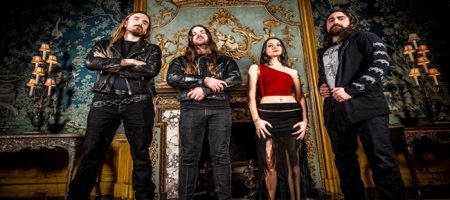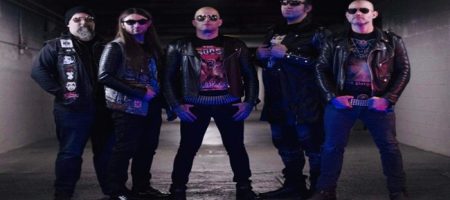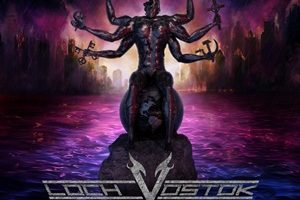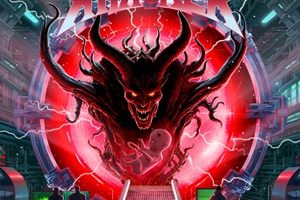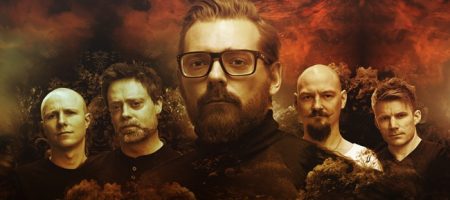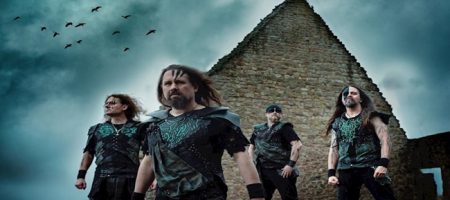Angra – Evolution in Cycles
Tuesday, 21st November 2023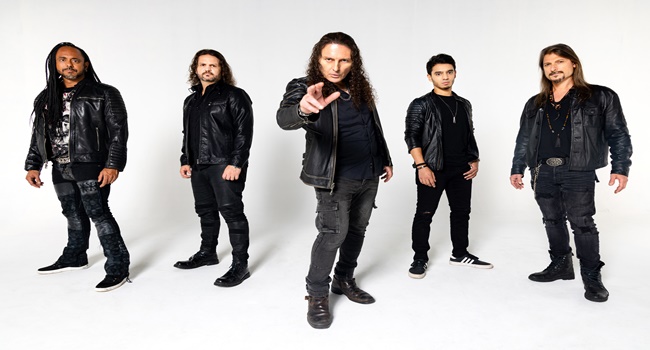
Photo: Marco Hermes
When it comes to developing a unique brand of melodic power/progressive metal, no one can dispute the impact of Angra on a global scale. Making a strong impact out of the gate through their debut album Angels Cry in 1993, they survived numerous lineup changes to still make a great impression with their fans and the media. Current vocalist Fabio Lione joined the band a decade ago, now appearing on his third album for the group with Cycles of Pain – the tenth studio record overall. Injecting their music with some of their Brazilian heritage as well as pop, jazz, and classical nuances, you can always rest assured that these musicians give their all in their passion and belief for what they do.
We spoke to guitarist Rafael Bittencourt and bassist Felipe Andreoli about the work behind the new album, the personal subject matter covered on the record, how no album ends up being like the other due to their diverse influences, how to balance an ideal set list in live situations, thoughts on the music industry today, the importance of Sepultura’s impact on proving the vitality of heavy music from Brazil for worldwide appeal, and future plans.
Dead Rhetoric: Cycles of Pain is the latest Angra studio album. What can you tell regarding the songwriting and recording process for this effort – and where do you feel this record sits in the discography of the band?
Felipe Andreoli: Well, I think my overall impression now that the record has been done is that it was a very pleasurable process. We were excited to do this after so many years apart. It had been five years since Ømni and also two and a half years since we had met each other because of the pandemic. There was a strong willingness and drive to just write music together and play together, you know? It all started last year when we toured together to celebrate the 20th anniversary of the Rebirth album. That got us reacquainted with one another and the stage. That was the starting point for the full-blown writing process.
As far as where Cycles of Pain sits in the discography. I think it’s very symbolic that it’s the tenth studio album that we’ve put out. It’s a marriage of the past and future of Angra. It’s always a balance between what we were and what we will be. We are always changing and evolving, while at the same time maintaining our roots, our main elements that were always there. It’s a mixture of innovation and being just a classic band.
Rafael Bittencourt: In addition to that, I can say that at first, I wanted the title to be the number ten in Roman numerals because of that symbol. The word cycle was very much in my head, and I brought this up for the title of that song “Cycles of Pain”. It’s a confirmation of our discography, and of this lineup. It’s hard as a classic band for so long, people compare you to your own past. It’s good, because people know about you – but it’s not so good because people are always expecting different things from you. We want to move forward; we want to innovate as Felipe said. It’s a confirmation of what we are.
Dead Rhetoric: The lyrical content channels a lot of personal pain, challenges, frustrations from the band – including handling the death of your father and former singer Andre Matos among others. Discuss the importance of channeling these emotions/experiences into your compositions – do you feel like you are cleansing and healing as a result of this process?
Bittencourt: Yes, and also embracing and supporting those who are in pain. Here it is not to highlight the pain, but to talk about the cycle and how natural it is. Young people nowadays, they don’t view pain as a natural thing. Many times, they want to treat it as a disease. Emotional pain like anguish, anxiety, panic, also depression, at the beginning of it, they can be treated – but there is a certain amount of normality to that. Part of the feeling is to embrace the pain. When you grieve for someone who is dead, it’s not like you just can take medicine to heal. It’s something you need to endure, and that pain can transform into emptiness and then into good memories, then into how that person that you are missing is present in your life in a light and positive way. The idea of talking about pain is giving them a positive perspective of it.
Dead Rhetoric: How does it feel to be a part of the Atomic Fire Records roster in comparison to some of the other record labels you’ve been a part of in the past?
Andreoli: We are really proud to be a part of the roster. We’ve admired their work ever since they were a part of Nuclear Blast. They have a great roster of bands that I love. We are very happy with them, it’s a strong partnership. I think it will be a chance for new people to know about Angra, and also for people that knew Angra from the 90’s to become reacquainted with the band, to know that we are still around.
Dead Rhetoric: How much of a challenge was it to decide what singles to premiere from the record? There have been three singles released so far – are you happy with the response so far to these tracks?
Bittencourt: This time it was very hard; we had many singles on the record from our perspective. We want to present to the people different styles that we embrace and that will work. We are very happy; the response has been very positive to all of the (singles).
Dead Rhetoric: As a group, you seem very willing to incorporate numerous out of the box influences from jazz to modern elements, beyond your Latin roots, and make things seamless in the progressive/power metal context. Do you believe this has been an important trait to help Angra become an original leader versus a follower in the music world?
Andreoli: Absolutely. It’s not so conscious as you would say. It’s part of who we are as musicians to listen to and play different types of music with different people and bring this knowledge into the songwriting process for Angra. The prog element in Angra to me is something that welcomes many different influences and styles to be mixed with the more traditional, power metal stuff. And that’s what makes it unique, of course the Brazilian grooves which are natural to us, we listen to Brazilian music, and we live Brazilian culture, that’s just natural to us. We add to that everything that we learn as musicians that we play, as you mentioned jazz or even pop. We are open to these new influences to be joined to what we have been doing.
That’s why no Angra album is like the next one. If you listen to Angels Cry then Holy Land or Fireworks, or maybe Temple of Shadows to Aurora Consurgens, all these albums are very different from one another – even when they have the same people. That speaks to our ways to incorporate a lot of different things.
Bittencourt: In addition to that, we have since the beginning focused on creating, bringing depth to our music. More than sophistication, more than impressing people, we want to touch deep the feeling to dig into references. In order to make it we need to dig within ourselves. There is no way of going deep within ourselves without experimenting, exploring our own background. This is our reality. The sounds that we combine are very present within our background, our musicianship. That is to really create something meaningful to the people.
Dead Rhetoric: Are you satisfied at this point with the level of achievement and success that Angra has – or do you believe that there are always new mountains to climb and territories to conquer?
Andreoli: After 32 years I’m just happy that we are able to keep doing what we do – and do it at a high level. To be comfortable and have a comfortable working environment, and to have good relationships. That’s the first thing. With that being said, of course we want more. We want to reach new people, play for more people, and for more people to know about the music – but that’s always a consequence of the work we do. Now, having this lineup established for over eight years already, really helps to build the relationship with the audience. We’ve had so many changes, it’s easy for people to kind of lose contact with the band or move on to new music. Having this steady lineup, it’s really important. The relationship we have, it’s very transparent in the music because it’s so great between us, the music happens so naturally, so effortlessly. I think the people can hear that.
Dead Rhetoric: When looking at the career arc of Angra, what would you consider some of the highlight moments where you knew you were taking things to the next level as far as musical satisfaction or personal achievements? They can be related to particular albums, tours, or festival shows…
Andreoli: I think one great example of that is after Rebirth where we had three new members, we had a lot to prove to the world, to the fans, and to the press. And I think we did, mission accomplished. And when we assembled to write the next album Temple of Shadows, we felt much freer just to explore, to be happy doing the music without so many constraints, without having to follow a recipe, and that allows us to really bring out the best in each and every one of us.
I think the same can be said with Cycles of Pain. Secret Garden was a transitional album, there were a lot of uncertainties. Ømni is the first album with a more established lineup, and it was a success as far as we were concerned. We felt we were free to explore and go for it. The Angra elements, it’s not so conscious but we all know inside. We don’t have to keep referencing our own music, we just know (what to do). When we write music, it comes out naturally. When we venture into new territories, it’s always informed by what we were before, and what we’ve always been.
Dead Rhetoric: Has there ever been a favorite failure in your musical career, where when you look back it actually set you up for a future breakthrough or success?
Bittencourt: When Andre Matos left, and we regrouped with new members to write Rebirth, it was the favorite failure.
Dead Rhetoric: Considering the different singers throughout the history of Angra, how do you decide in a headlining situation with Fabio what songs to handle from the ten albums? Does it become a balancing act between what you desire to play as musicians as well as certain fan favorites that cannot be avoided?
Andreoli: It’s a triple balance. It’s what we want to do, it’s what we think the fans want, and what the band is willing to do. The songs are sometimes very challenging to learn and to play at a high level. So, it’s really tough every time to come up with a new set list. We have a lot of back and forth on opinions and having the time to put into and work on different difficult songs and difficult passages. It’s getting tougher, we want to play the new music and we really like it. The fans respond to the new music really well live, so we feel like it’s necessary to have it there. That leaves less and less space for older songs. We don’t like to repeat ourselves so much as we like to have variety on the set list. Deciding what new and old songs we will incorporate is a challenge. Fabio in that sense is really flexible, as he can sing pretty much anything. He can sing some of the really high stuff that Andre did – but of course no one can sing those songs quite like Andre. Apart from those, we can basically play anything. This band feels like sometimes driving a high-end sports car. Step on the gas, and it will just go. We don’t really feel constrained by our abilities in learning old songs or playing new music or composing new music.
Dead Rhetoric: What are your thoughts on the ever-evolving, ever-changing landscape of the music industry currently? What do you think can be done to ensure proper support for the musicians and develop a sustainable, supportive model for the future of the business?
Bittencourt: The music business is fully related to the lifestyle of the people. It has always been, but now people live in very narrow realities. They are bombarded by information, and digitally they filter the kind of information that will get to them, based on what they like or dislike. In metal for instance, we need to show the metal lovers that the metal scene is bigger than their preferences. Because if we have small islands of preferences isolated from each other, we’ll never be as big as a movement, a music movement, as a lifestyle as it was in the 1980’s. Festivals, the European festivals like Wacken, Sweden Rock, Copenhell, they are a very clear expression of how important and relevant this is for our lifestyle and the way we live. The way we listen to music individually, if we can add our lifestyle to it. We listen to music individually with our headphones, going to work, or the gym. And in huge festivals with everyone together – but there is a missing link in between when we should gather in small groups of ten people or so to listen to music, or small parties of twenty to fifty people. To learn about how other people listening to music can connect to these personalities. I have a friend, and it’s good when I share music with him, exposing him to music, and he does the same for me. It gives you a wider perspective of the correlation between music and personality, business and lifestyle.
Dead Rhetoric: You’ve done fabulous covers with “Wuthering Heights” by Kate Bush and “Synchronicity II” by The Police on your albums. Have you ever heard any feedback from the artists themselves on your versions – as it seems like you’ve made both tracks your own given they aren’t in the metal realm. Are there other artists that you’ve thought about covering down the line?
Andreoli: Unfortunately, we haven’t heard from the artists we did the covers for. I would love to hear their impressions. We covered these songs just because we love them, and sometimes we have the idea just for a goof. In the case of “Mama” on Hunters and Prey, that’s what we did. With “Synchronicity II”, we love that song. We have thought of many other artists we would love to cover. Sometimes we lack the time to do it, and sometimes it’s just hard to get the authorization to do them, licensing for it. I’m sure in the future we will do more.
Bittencourt: There are so many artists that we admire that we would love to cover.
Dead Rhetoric: What are some common misconceptions that you believe fans may have regarding Angra – and how does the band balance their workload with family, friends, and outside jobs or activities?
Bittencourt: It’s always hard to position Angra as a specific label or frame. Because, as I said, people are narrow in their categories, and since we combine different references, different preferences and styles, it’s always hard. Many melodic people, they think we go too proggy, many progressive metal fans think we are too melodic and epic. For some more traditional fans, they don’t like the combinations of rhythms, the dancing rhythms. It’s always hard to have that. We are honest to what we like. I’ve been doing this since I was nineteen. I finished seven years of university, together with touring, recording, a lot of appointments, and I got married. Real life flows together with what we do.
Dead Rhetoric: Considering you are from Brazil, many people understand that it’s hard for any metal band from your country to make it on a global scale. Did you look to a band like Sepultura as a mentor and inspiration, even if they were in a different style of heavy music, to achieve your goals and dreams?
Andreoli: Sure. Sepultura was like a beacon for Brazilian metal. When they came out, there was that sense that they make metal music from the jungle. For many years, people had this impression that Brazil was some sort of forest, instruments made out of trees that we developed. We proved that that’s not the case. We had many artists coming out of Brazil before that, but in the metal realm Sepultura was really the first one. The openers of this market, the storm of many other future bands to come. And with the Brazilian rhythms and style they incorporated, they really valued our Brazilian roots around the world. That was very nice, and very rich.
Dead Rhetoric: How did you feel about Kiko stepping away from the band to join Megadeth back in 2015? Do you still try to keep in touch with him on a regular basis when possible?
Bittencourt: Oh yes. First of all, I’m very proud of him. We all cheer for each other, the individual successes. He has always wanted to position himself as one of the best guitar players in the world. We’ve always supported him. It was almost a natural thing for him to join. We do still keep in contact with him. In fact, we manage the back catalog together, the relationship with the old record companies. He is still a part of the business of Angra.
Dead Rhetoric: What’s on the horizon for activities related to Angra to support this new record over the next year or so?
Andreoli: We plan to tour extensively. We are already looking into the possibilities to tour Europe, Japan. We have plans for Brazil and Latin America. For the US, we have 70,000 Tons of Metal coming up in January, plus the ProgPower festival in September. Maybe we will work around those dates in September, to find more dates to visit some of the main cities in the US. There is also a possibility of a full-blown tour in the US, we are evaluating those possibilities as well.











